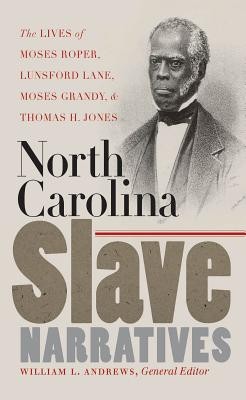
- We will send in 10–14 business days.
- Publisher: University of North Carolina Press
- ISBN-10: 0807856584
- ISBN-13: 9780807856581
- Format: 15.2 x 23.2 x 1.8 cm, softcover
- Language: English
- SAVE -10% with code: EXTRA
North Carolina Slave Narratives (e-book) (used book) | bookbook.eu
Reviews
Description
The autobiographies of former slaves contributed powerfully to the abolitionist movement in the United States, fanning national--even international--indignation against the evils of slavery. The four texts gathered here are all from North Carolina slaves and are among the most memorable and influential slave narratives published in the nineteenth century. The writings of Moses Roper (1838), Lunsford Lane (1842), Moses Grandy (1843), and the Reverend Thomas H. Jones (1854) provide a moving testament to the struggles of enslaved people to affirm their human dignity and ultimately seize their liberty.
Introductions to each narrative provide biographical and historical information as well as explanatory notes. Andrews's general introduction to the collection reveals that these narratives not only helped energize the abolitionist movement but also laid the groundwork for an African American literary tradition that inspired such novelists as Toni Morrison and Charles Johnson.
The autobiographies of former slaves contributed powerfully to the abolitionist movement in the United States, fanning national--and international--indignation against the evils of slavery. The four texts gathered here are all from North Carolina slaves and are among the most memorable and influential slave narratives published in the nineteenth century. The writings of Moses Roper (1838), Lunsford Lane (1842), Moses Grandy (1843), and the Reverend Thomas H. Jones (1854) provide a moving testament to the struggles of enslaved people to affirm their human dignity and ultimately seize their liberty. Introductions to each narrative provide biographical and historical information as well as explanatory notes.
- Publisher: University of North Carolina Press
- ISBN-10: 0807856584
- ISBN-13: 9780807856581
- Format: 15.2 x 23.2 x 1.8 cm, softcover
- Language: English English
The autobiographies of former slaves contributed powerfully to the abolitionist movement in the United States, fanning national--even international--indignation against the evils of slavery. The four texts gathered here are all from North Carolina slaves and are among the most memorable and influential slave narratives published in the nineteenth century. The writings of Moses Roper (1838), Lunsford Lane (1842), Moses Grandy (1843), and the Reverend Thomas H. Jones (1854) provide a moving testament to the struggles of enslaved people to affirm their human dignity and ultimately seize their liberty.
Introductions to each narrative provide biographical and historical information as well as explanatory notes. Andrews's general introduction to the collection reveals that these narratives not only helped energize the abolitionist movement but also laid the groundwork for an African American literary tradition that inspired such novelists as Toni Morrison and Charles Johnson.
The autobiographies of former slaves contributed powerfully to the abolitionist movement in the United States, fanning national--and international--indignation against the evils of slavery. The four texts gathered here are all from North Carolina slaves and are among the most memorable and influential slave narratives published in the nineteenth century. The writings of Moses Roper (1838), Lunsford Lane (1842), Moses Grandy (1843), and the Reverend Thomas H. Jones (1854) provide a moving testament to the struggles of enslaved people to affirm their human dignity and ultimately seize their liberty. Introductions to each narrative provide biographical and historical information as well as explanatory notes.


Reviews